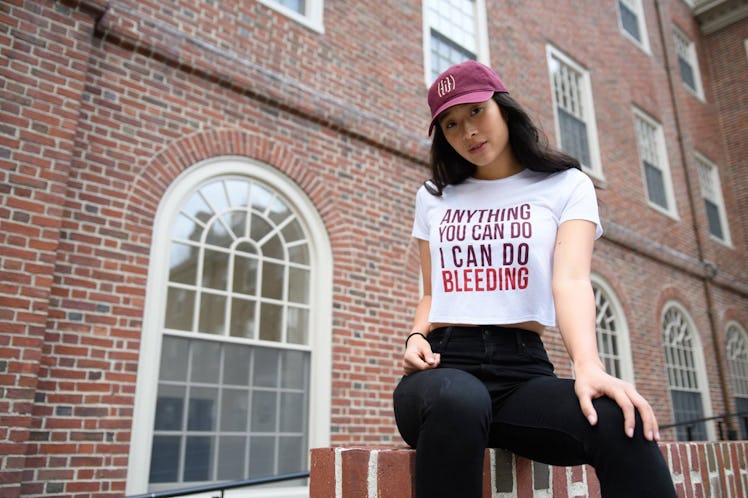
1 In 5 Teens Can't Afford Period Products, Per This Heartbreaking Survey
Oct. 19 marks the first annual National Period Day, and around the world, many people still don't have access to the menstrual hygiene products or sanitary conditions they need — and the United States is no exception. According to the new State of the Period survey released Oct. 17 by menstrual nonprofit PERIOD and period underwear company Thinx, one in five teens can't afford period products in the United States. For these teens, this menstrual inequity can result in stress, missed class time, risks of infection, and other devastating repercussions, per the survey.
The results are staggering. Of the 1,000 U.S. teens — ages 13 to 19 — who were surveyed via the an online poll between Aug. 5 and 16, 2019, 61% reported that they had worn pads or tampons for more than the recommended four hours due to lack of access to menstrual hygiene products. Keeping a pad or tampon on for too long can render people vulnerable to infection and toxic shock syndrome (TSS). The study, commissioned by Thinx, also found that one in four teens have missed part or all of a class because they were unable to access necessary period products. According to CBS News, these statistics all exemplify period poverty, which describes the inability to access menstrual hygiene products, clean water, and other necessities due to a lack of sufficient income.
In recent years, activists both in the United States and around the world have worked to combat period poverty in an effort to achieve menstrual equity, so that every menstruating person can access the resources they need when they're on their period. One of these activists is 21-year-old Nadya Okamoto, a junior at Harvard University and the co-founder and executive director of PERIOD. Okamoto tells Elite Daily that she founded PERIOD after realizing just how difficult it was for low-income people and people experiencing homelessness to access menstrual hygiene products.
"I started Googling and learning that periods are the number one reason why girls miss school in developing countries, but also being a leading cause of absenteeism for girls in the U.S.," Okamoto recalls. When people don't have access to pads, tampons, or other menstrual hygiene products, they often resort to makeshift management techniques, like socks or toilet paper, none of which are comfortable or sanitary, as Okamoto explains. What's more, as of 2014 — the year that Okamoto and then-classmate Vincent Forand founded PERIOD — 40 states in the United States imposed a sales tax on period products, though efforts from activists have brought that number down to 35 as of 2019.
Menstrual care does become a matter of dignity.
According to the survey from Thinx and PERIOD, a lack of access to period products contributes to increased stigma around menstruation, lower rates of classroom productivity, and increased stress for students who already have so much on their plates. The study also found that despite the pervasiveness of menstrual inequity, 83% of the teens surveyed feel that this lack of access to menstrual hygiene products is not sufficiently discussed or addressed in the classroom.
Consequently, 79% of the teens surveyed reported wanting more in-depth education on menstrual health in schools. According to Okamato, PERIOD is trying to combat the stigma around periods by improving how people are educated on the topic.
"The health of your vagina is something that is very personal but also something I think that we’re still trying to get people to be more educated about, know what questions to ask," Okamoto explains. "And I think that menstrual hygiene management — all the way to managing any symptoms of period pain and PMS — is something we’re really trying to work on with our educational program."
A 2019 study from Saint Louis University’s College for Public Health and Social Justice found that 46% of women surveyed in St. Louis, Missouri, often had to choose between buying food and period products because they could not afford both. In Okamoto's view, the Thinx and St. Louis studies make something clear beyond a doubt: To achieve menstrual equity, everyone needs to be talking about and educating themselves on periods and menstrual hygiene. That's why PERIOD and Thinx are calling on Congress to pass legislation allowing period products to be covered by Medicaid and pre-tax flexible spending accounts. The survey release also calls on Congress to pass the Menstrual Equity for All Act (H.R. 1882), which would require schools to provide free menstrual products to students who need them and create guidelines to promote access to menstrual products for people experiencing homelessness and for incarcerated people.
In addition to advocating for legislative policies that would make period products more accessible in schools, shelters, and prisons, PERIOD and Thinx both want to remedy existing gaps in education around periods in order to eliminate stigma and shame.
"Menstrual care does become a matter of dignity and feeling clean, confident, and capable whether or not you’re menstruating," Okamoto says. "It’s a human right to be able to discover and reach your full potential regardless of a natural need, and I think that’s really where the passion for our work comes from."
This article was originally published on